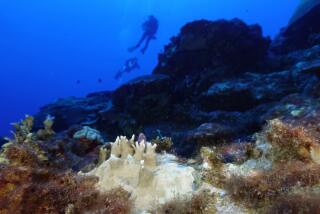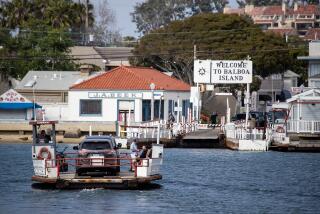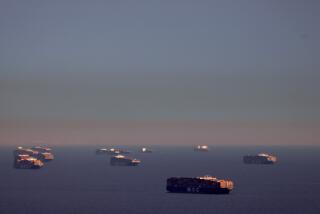Panel OKs Unloading of Ship : Cargo of Coal Becomes Too Hot to Handle
- Share via
Not long after the cargo ship Fort Providence set sail from New Orleans last month with 54,000 tons of coal destined for a power plant in Taiwan, its captain and crew discovered they had a problem.
The British-owned ship’s $2-million cargo was heating up to dangerous temperatures.
“After passing through the Panama Canal, the captain sent a cable advising us that the coal was too hot” to continue the voyage, said C. P. Magh, an agent representing Showa Line, the Japanese company that leased the vessel. “They said they had to head for the nearest port that could take them.”
The Fort Providence was scheduled to spend a day or so refueling in Long Beach, so on June 26 the steamy vessel--portions of its cargo estimated to be hotter than 132 degrees--set anchor inside the San Pedro Bay breakwater.
Nearly five weeks later, the Fort Providence has not budged, and the Mississippi-mined coal stuffed in its hull has now topped a toasty 160 degrees.
But on Thursday, the owners caught sight of a potential solution.
Coast Guard and Port of Long Beach officials trace the overheating to the extremely humid conditions under which the coal was loaded in the Mississippi Delta. That prevented the release of heat that normally occurs through the evaporation of moisture in coal. Once on the high seas, the temperature continued to rise.
“Basically, coal is a fuel, and when it gets warm, there is the possibility that it will start to burn,” said Andrew Pearce, the assistant chief wharfinger for the Port of Long Beach. Los Angeles fire officials, who have been called in to help determine what to do with the ship, said that if the cargo gets much hotter--in the vicinity of 180 degrees--the reaction will begin accelerating to a point where it cannot be controlled.
As a result, fire officials and owners of the ship have been reluctant to return it to sea. Three weeks ago, bulldozers pounded the coal to force out the air pockets in hopes of lowering the temperature, but the four-day belting did little more than keep the coal from getting any hotter.
“It is just sitting there, and nobody can decide what to do,” said Magh, whose company is paying about $6,000 a day to lease the vessel. “The temperature just won’t go down.”
On Thursday, officials from Kaiser International Corp., a company that exports coal from the Port of Los Angeles, brought the case of the Fort Providence to the South Coast Air Quality Management District. Richard E. Holdaway, president of the company, said he wanted a variance from air pollution regulations so that his company could unload the coal at his 26-acre San Pedro facility, spread it out, cool it off, reload it and send the vessel on its way.
Cargo, Vessel ‘at Risk’
“Both the cargo and the vessel are at risk if the cargo remains aboard,” said Holdaway, who is negotiating a contract with Canadian Pacific, the owners of the ship, to unload the cargo. Kaiser International is expected to charge nearly $800,000 for the job, he said.
The air quality district’s hearing board said that under the circumstances, it had little choice but to grant the variance. But it did so over the objections of pleasure boaters concerned about pollution in the harbor and Los Angeles Councilwoman Joan Milke Flores, who represents the harbor area.
Lewis H. Chaney, an aide to Flores, said the councilwoman was concerned about dust and odors from the coal piles. Chaney said Flores was also worried that the coal, once removed from the vessel, might become a fire hazard to other port facilities.
Begin Unloading Sunday
But with the variance, Kaiser International can begin unloading the coal on Sunday in what should be the final phase of a tale that has angered many people, not the least of whom chairs the air quality hearing board.
“It might be a nice idea to send copies of the bills to the fire chief in New Orleans,” Chairwoman Coralie Kupfer told a representative of the Los Angeles Fire Department, which must monitor the unloading. “I am not crazy about them exporting their fire problems here.”
More to Read
Sign up for Essential California
The most important California stories and recommendations in your inbox every morning.
You may occasionally receive promotional content from the Los Angeles Times.













